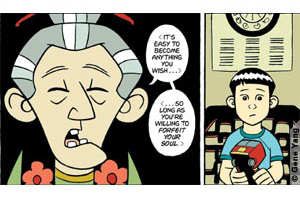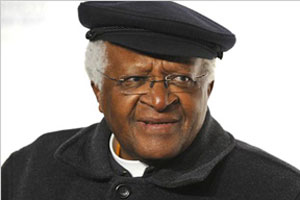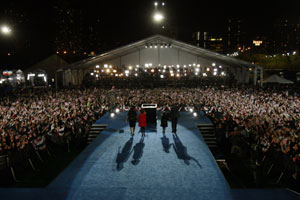Focus on America
Graphic novels - Drawing the Asian-American Experience

Asian-American artists and writers have attained considerable prominence as creators of sophisticated graphic novels, many of which explore cultural identity and social issues.
Graphic Novels: An Evolving Art Form Tackles New Themes
Asian-American authors explore identity, cultural roots
By Lauren Monsen
Staff Writer
Washington ─ In recent years, Asian-American artists and writers have attained considerable prominence as creators of sophisticated comic books and graphic novels, lending an adult sensibility to a medium that once appealed mostly to a juvenile audience.
The term “graphic novel” refers to a storytelling format that combines cartoon-style drawings and dialogue, but addresses more mature themes than the traditional comic book. Now, Asian-American artists are lending their perspective to the genre. Through the graphic novel, authors such as Adrian Tomine (a fourth-generation Japanese American), Gene Luen Yang (a Chinese American) and Derek Kirk Kim (a Korean American who immigrated to the United States at age 8) are exploring questions about identity, cultural roots and social issues that relate to growing up as members of a racial minority in a predominantly white society.
Tomine, creator of the comic-book series Optic Nerve, became known as a prodigy of sorts by independently publishing his own material while still a teenager. Now in his mid-30s, Tomine is the author of Shortcomings (2007), a work praised by Publishers Weekly as “an irresistible gem of a graphic novel.” Revolving around the character of Ben Tanaka, a 30-year-old Japanese American, the book raises questions about cultural assimilation, the psychological nuances of interracial dating and the occasionally mortifying process of self-discovery.
In an interview with America.gov, Tomine explained that Shortcomings is sometimes misconstrued as autobiographical because its protagonist is Japanese American. “Shortcomings was the result of years of making mental notes and collecting observations, although it is entirely a work of fiction,” said Tomine.
Gene Luen Yang is author of American Born Chinese and co-author of the short-story collection The Eternal Smile.“When I first started working as a cartoonist, I was a bit taken aback by how often I was asked about why I wasn’t addressing my ethnic heritage in my work. The expectation that anyone from a minority group should make that experience the sole focus of their creative endeavors was somewhat off-putting to me,” he recalled. “But as time passed, I started to envision a way in which I might be able to address those issues and remain consistent with my other work.” Tomine said he deliberately avoided making generalizations about Asian Americans ─ or anyone else: “It was important to me to avoid any kind of didacticism or grandstanding.”
The opening pages of Shortcomings reveal that Ben and his girlfriend, Miko, are living together in Berkeley, California. Miko suspects Ben is attracted to white women (which he is, though he denies it). Neglected and unhappy, Miko leaves for New York, ostensibly to accept an internship. Ben does not realize that she is, in effect, breaking up with him; he assumes the relationship is simply on hiatus, and he views Miko’s absence as an opportunity to date white women without Miko finding out. Some time later, Ben visits New York at a friend’s urging. He tracks down Miko, and is shocked to learn that he has been displaced by Miko’s new (biracial) boyfriend.
Tomine’s understated black-and-white drawings and pitch-perfect dialogue illuminate his protagonist’s reflexive hypocrisy: Ben feels entitled to pursue interracial relationships, yet objects to Miko doing so. Unfolding as a series of vignettes, Shortcomings captures the frequently chaotic pace of modern life, while hinting that Ben might be on the first step to maturity. “The story’s conclusion is open to interpretation, perhaps to a frustrating degree,” said Tomine. Ben’s fate will remain ambiguous, since Tomine has no plans to revisit him in a future book.
“I think the very fact that it would be easy and kind of fun for me to continue writing about Ben Tanaka is the perfect reason why I shouldn’t,” added Tomine. “Even though I don’t think Shortcomings is a perfect book, I’m pretty sure that if I continued the storyline, it would only diminish what I’ve already done.” His next project will be a collection of linked short stories, with full-color illustrations.
Like Tomine, Yang (author of American Born Chinese, 2006) and Kim (author of Same Difference and Other Stories, 2004) have achieved cult status within the comics industry ─ as well as a broader reputation as serious literary talents. American Born Chinese, which won the Michael L. Printz Award and was named a National Book Award finalist, interweaves a Chinese fable with the story of a Chinese-American teenager who rebels against his minority status in a U.S. high school. Kim, whose short-story collection casts a humorous eye on the foibles of Korean-American characters living in northern California, has the viewpoint of a first-generation Korean American who came of age in the United States but still retains memories of South Korea. Friends as well as colleagues, Yang and Kim have collaborated on a newly published work, The Eternal Smile (2009), with Yang providing the dialogue and Kim supplying the artwork.
Graphic novels are attracting a rapidly expanding fan base. Above all, authors like Tomine are interested in using the genre simply to tell a good story. “The best compliment someone could give me about Shortcomings is that they simply enjoyed reading it,” said Tomine.
Recently on Focus on America
Americans May Be Thinking About Identity in New Ways
 Most scholars, writers, politicians and others agree that with the possible exception of the American Indian, to be American is to be, genealogically speaking, from somewhere else in the world. America.gov explores how choosing individual identity is an ever-shifting process.
Most scholars, writers, politicians and others agree that with the possible exception of the American Indian, to be American is to be, genealogically speaking, from somewhere else in the world. America.gov explores how choosing individual identity is an ever-shifting process.
Desmond Tutu Awarded 2008 U.S. Fulbright Prize
 If peace and understanding could be human, then South African Archbishop Emeritus Desmond Tutu would be one of the best examples of these concepts because few have worked harder for them, often in the face of insurmountable odds.
If peace and understanding could be human, then South African Archbishop Emeritus Desmond Tutu would be one of the best examples of these concepts because few have worked harder for them, often in the face of insurmountable odds.
World Celebrates Barack Obama’s Historic Win
 In homes and on streets across the United States, Americans celebrated the election of the first African-American president as a significant moment in U.S. history.
In homes and on streets across the United States, Americans celebrated the election of the first African-American president as a significant moment in U.S. history.